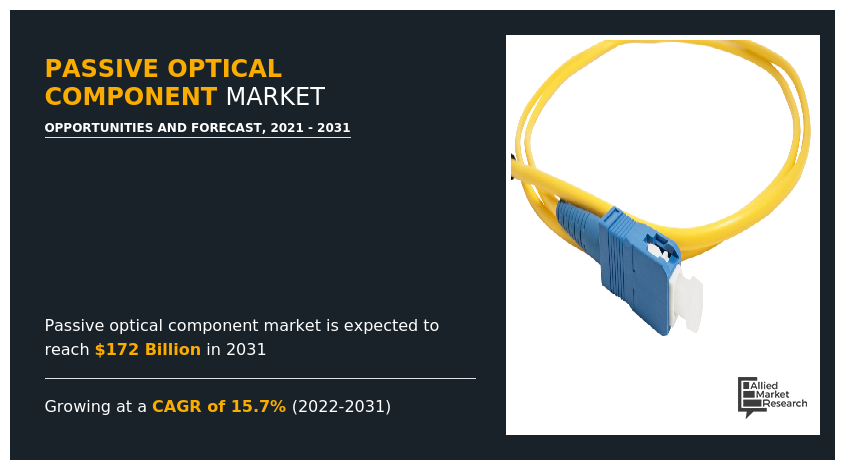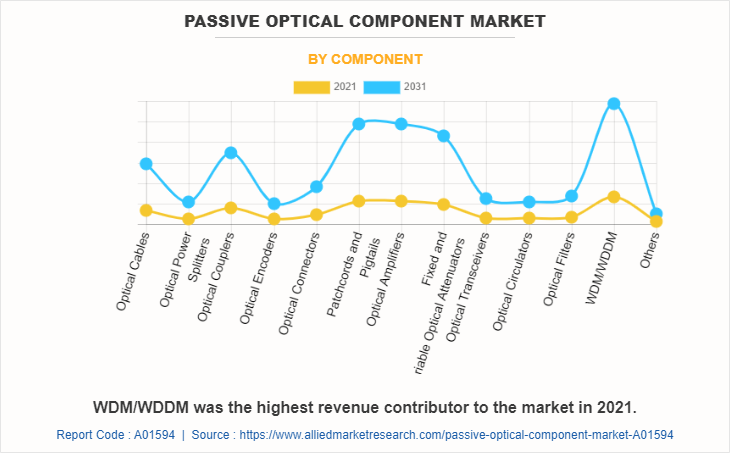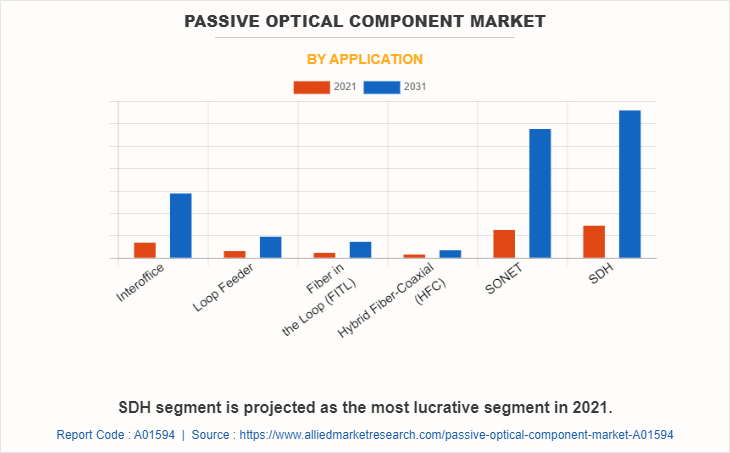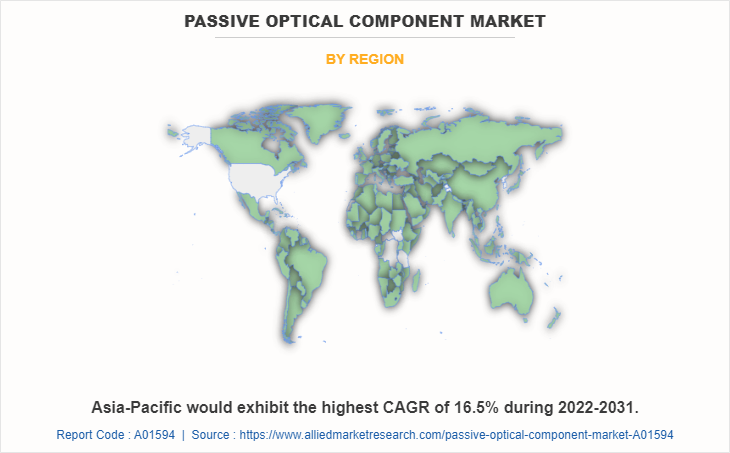Passive Optical Component Market Research, 2031
The global passive optical component market was valued at $39.4 billion in 2021, and is projected to reach $172 billion by 2031, growing at a CAGR of 15.7% from 2022 to 2031.
Optical components such as optical passive optical component, active optical component. optical power splitters, optical couplers, optical encoders, and optical connectors are the major components of optical network system. Passive optical components are also used in FTTH (Fiber to the Home) networks for branching of optical signals, multi/de-multiplexing, and for optical surveillance systems of video signals. Passive optical components do not require electrical-to-optical or optical-to-electrical conversion during its operation. Passive optical components include not only simple optical connectors and fixed optical attenuators, but also more complicated, electronically controlled, optical devices like switches and variable optical attenuators.

Segment Overview
The passive optical component market is segmented into Component and Application.

By component, the market is divided into optical cables, optical power splitters, optical couplers, optical encoders, optical connectors, patch cords & pigtails, optical amplifiers, fixed &variable optical attenuators, optical transceivers, optical circulators, optical filters, WDM/WDDM, and others. The WDM/WDDM segment was the highest revenue contributor to the market in 2021.

By application, the market is segmented into interoffice, loop feeder, FITL, HFC, SONET, and SDH. The SDH segment was the highest revenue contributor to the market in 2021.

By region, the market is analyzed across North America, Europe, Asia-Pacific, and LAMEA.
The passive optical network is categorized into two types, in terms of its structure, namely gigabit passive optical network (GPON) and Ethernet passive optical network (EPON). GPON terminal devices offer high-speed voice, video and data services to business and residential subscribers. Reliability and last-mile long-reach connection reduces quantity of active switching devices used in a computer network. EPON offers services such as internet protocol television (IPTV) and residential broadband, enterprise services, voice services such as internet and voice connectivity, 3G &4G mobile backhaul, time division multiplexing (TDM), and carriage services.
Major drivers such as high growth in IP traffic, increase in FTTH requirements, demand for scalability in mobile network, advancements in GPON SoC technologies, and high return on investment, and low cost of ownership propel the market growth. However, difficulty in managing failure of PON and less range of network devices connection restrain growth of the passive optical component industry.
Moreover, increase in demand for higher and broadband bandwidth and shift toward high-capacity optical networks provide lucrative opportunities for the growth of passive optical component market size. The passive optical component industy is experiencing significant growth, globally, owing to rise in use in optical fiber network, optical amplifiers, and optical power splitters for passive network. These passive optical components are highly reliable; thus, maintain the quality of fiber material. These components are also priced less. However, higher operational and installation cost is the major factor that restrain growth of the passive optical component market share.
Significant factors include rise in demand for passive optic network, smart phones, tablets, and other electronic devices. In addition, an enhanced efficiency of passive optical components and shift of users toward high-capacity optical networks also propels the passive optical component market growth. The above-mentioned factors collectively create opportunities for the market growth, while factors such as difficulty in managing failure in mobile network communication and less network connection range poses limitations for the market growth. Hence, each factor is expected to have its definite impact on the market during the forecast period.
Competitive Analysis
Competitive analysis and profiles of the major passive optical component industry players, such as Alcatel-Lucent S.A., ZTE Corp., Motorola Solutions Inc., Huawei Technologies Comp. Ltd., Ericsson Inc., Tellabs Inc., Adtran Inc., Calix Inc., AT & T Inc., and Broadcom Corporation, Inc. provided in this report.
Key Benefits For Stakeholders
- This report provides a quantitative analysis of the market segments, current trends, estimations, and dynamics of the passive optical component market analysis from 2021 to 2031 to identify the prevailing Passive Optical Component Market Opportunity.
- The market research is offered along with information related to key drivers, restraints, and opportunities.
- Porter's five forces analysis highlights the potency of buyers and suppliers to enable stakeholders make profit-oriented business decisions and strengthen their supplier-buyer network.
- In-depth analysis of the passive optical component market outlook assists to determine the prevailing market opportunities.
- Major countries in each region are mapped according to their revenue contribution to the global market.
- Market player positioning facilitates benchmarking and provides a clear understanding of the present position of the market players.
- The report includes the analysis of the regional as well as global passive optical component market trends, key players, market segments, application areas, passive optical component market forecast and market growth strategies.
Passive Optical Component Market Report Highlights
| Aspects | Details |
| Market Size By 2031 | USD 172 billion |
| Growth Rate | CAGR of 15.7% |
| Forecast period | 2021 - 2031 |
| Report Pages | 260 |
| By Component |
|
| By Application |
|
| By Region |
|
| Key Market Players | Tellabs Inc., Ericsson Inc., Alcatel-Lucent S.A., Motorola Solutions Inc., AT & T Inc., ZTE Corporation, Huawei Technologies Comp. Ltd., Broadcom, Calix Inc., Adtran |
Analyst Review
The passive optical component market is anticipated to depict a prominent growth during the forecast period, owing to various factors, such as increase in investments in transmission and distribution of electric power that fuels demand for passive optical component. In addition, the market is influenced by growth in investments in the industrial sector and rise in urbanization. However, complex fault detection and removal process of errors hamper the market growth to a certain extent. Moreover, favorable renewable energy policies provided by governments of key countries fuels growth of the market. Each of these factors is anticipated to have a definite impact on the global passive optical component market during the forecast period.
The passive optical component market exhibits high growth potential in commercial and industrial sectors. The current business scenario has witnessed an increase in demand for energy, particularly in developing regions such as China and India, owing to surge in population and rise in demand for energy. Companies in this industry have adopted various innovative techniques, such as mergers and acquisitions to strengthen their business position in the competitive matrix.
The market growth is supplemented by proactive industrialization efforts and surge in manufacturing output, owing to technological advancements. These factors are expected to allow emerging markets to evolve as largest markets during the forecast period, both from the demand as well as the supply side. Public & private organizations have substantially invested in R&D activities and fabrication techniques to develop cost-effective optical components.
Asia-Pacific is the major revenue contributor in the global market, followed by North America. The market growth in Asia-Pacific and North America is expected to significantly increase during the forecast period. The passive optical component market provides numerous growth opportunities to market players such as Alcatel-Lucent S.A., ZTE Corp., Motorola Solutions Inc., Huawei Technologies Comp. Ltd., Ericsson Inc. and others. These companies are engaged in the process of product innovation, collaboration, and acquisition to expand their services across various regions.
The Synchronous Digital Hierarchy (SDH) is considered to be the leading application of Passive Optical Component Market.
Asia-Pacific is expected to be the largest regional market for Passive Optical Component.
Passive Optical Component Market size is estimated to be $171.98 billion.
The companies to hold the market share in Passive Optical Component are Alcatel-Lucent S.A., ZTE Corp., Motorola Solutions Inc., Huawei Technologies Comp. Ltd., Ericsson Inc., Tellabs Inc. and others.
The Passive Optical Component Market is expected to grow at a CAGR of 15.7% during the forecast period.
Loading Table Of Content...
Loading Research Methodology...



